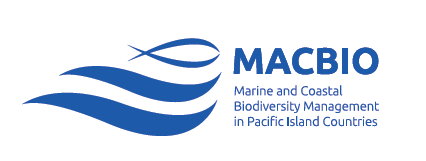Project Description
Title: Marine and coastal biodiversity management in the Pacific island countries and atolls
Commissioned by: German Federal Ministry for the Environment, Nature Conservation and Nuclear Safety (BMU)
Country: Pacific island region: Fiji, Kiribati, Solomon Islands, Tonga, Vanuatu
Lead executing agency: Secretariat of the Pacific Regional Environment Programme (SPREP)
Overall term: 2013 to 2018
Context
With a surface area of 180 million square kilometres, the Pacific makes up around half of the global ocean surface and a third of the earth’s total surface. The 22 Pacific island states and territories include more than 200 mountainous volcanic islands and approximately 2,500 flat islands and atolls. The exclusive economic zones (EEZ or 200-nautical-miles zones) of the five islands involved in this project in the South Pacific – Fiji, Kiribati, Solomon Islands, Tonga and Vanuatu – cover an area of 7.5 million square kilometres, 21 times the size of the Federal Republic of Germany.
The natural resources in marine and coastal areas not only play a significant role in the economies of the Pacific island states, they also constitute the population’s livelihood. Nonetheless, the need to conserve them and use them sustainably has scarcely been reflected in national planning processes to date, not least due to a lack of awareness of their economic value. Marine protected areas that have already been established are frequently not fully applied and are therefore not in a position to conserve biodiversity and ecosystem services in the mid and long term. Better management of the marine and coastal biodiversity of mountainous volcanic islands (Fiji, Solomon Islands, Vanuatu) and flat island atolls (Kiribati and Tonga) will help partner countries to reach their targets for 2020 as part of the strategic plan for implementation of the UN Convention on Biological Diversity.
Objective
The management of the marine and coastal diversity of mountainous volcanic islands (Fiji, Solomon Islands, Vanuatu) and flat islands and atolls (Kiribati, Tonga) is strengthened.
Approach
A central focus of the project is building and strengthening institutional and individual capacity for biodiversity conservation in marine and coastal areas in the five targeted countries.
Project measures encompass the economic evaluation of marine and coastal ecosystems and incorporating the results into national development planning. By means of the development and deployment of a spatial planning approach covering territorial waters and the exclusive economic zones, support is provided to the partner countries as they extend their national marine protected areas networks and gear them to ecological representativeness. The project aims to showcase best practice for the management of marine protected areas (including payments for environmental services) as well as the ensuing benefits in example areas.
Stabilisation of the reproductive cycles of fauna and flora and ecosystem services in the protected areas allows species populations to recover and to spread beyond the protected area limits. This is especially relevant for the conservation of a variety of endangered endemic species in the western part of the South Pacific. It also means that deep-sea fishing, an important activity for the Pacific island states, benefits from a continuous and stable provision of ecosystem services in the areas surrounding the protected areas.
Tried and tested concepts and instruments are jointly applied across the Pacific and disseminated internationally as a result of the project. For this purpose, GIZ cooperates with the Secretariat of the Pacific Regional Environment Programme (SPREP) and the International Union for Conservation of Nature (IUCN).
Links
Nab Portal: www.nab.vu
MACBIO website: macbio-pacific.info
MACBIO was instrumental in developing Vanuatu's Ocean Policy. It's on the MACBIO website, as well as on the NAB Portal link: www.nab.vu/vanuatu-ocean-policy
Furthermore, a Vanuatu Marine Ecosystem Service Valuation report can be downloaded on the MACBIO website, from the Nab Portal at www.nab.vu
Further Information and Support
Vatumaraga Molisa,
MACBIO country Liason Officer

